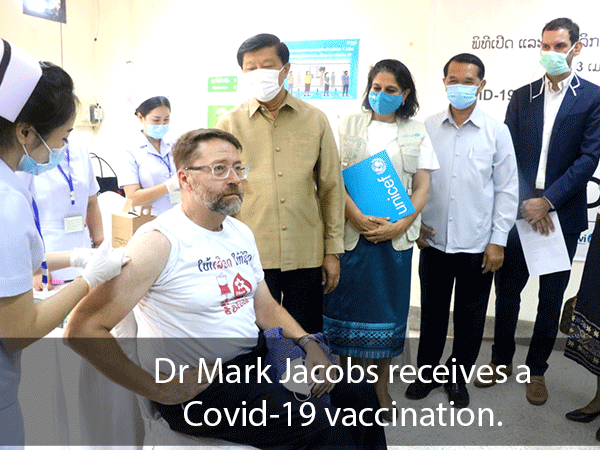Mass rollout of Covid-19 vaccine gets underway
The government has begun vaccinating the most vulnerable and at-risk groups in a step towards ending the acute phase of the Covid-19 pandemic.
The national rollout of COVAX-supported vaccines began at Mittaphab Hospital in Vientiane on Friday.
Present on the occasion was the Deputy Head of the Prime Minister’s Office, Mrs Thipphakone Chanthavongsa.
Vaccinations were administered on April 2 and 3, with the aim of immunising about 4,000 individuals categorised as being at the greatest risk of exposure to Covid-19 and those most likely to develop severe symptoms from infection.
 |
After this initial push the vaccines will be administered in seven main hospitals in Vientiane and the provinces.
The vaccines were received on March 20 and were provided by the COVAX Facility, a partnership between the Coalition for Epidemic Preparedness Innovations, Gavi, the Vaccine Alliance, UNICEF, and the World Health Organisation (WHO).
The shipment consisted of 132,000 doses of the Oxford/AstraZeneca vaccine manufactured by the Serum Institute of India.
This shipment is the first of Laos’ initial allocation of 480,000 doses. COVAX aspires to provide enough vaccine to supply at least 20 percent of the population this year, according to a press release from UNICEF.
Deputy Minister of Health, Associate Prof. Dr Phouthone Muongpak, said the mass vaccination using the first batch of Oxford/AstraZeneca vaccines supported by COVAX is another critical step towards achieving the country’s goal to end the acute phase of the pandemic.
To successfully end the pandemic, everyone must do their part, he said. It is vital that those who are listed in the most vulnerable and at risk groups get vaccinated so that all communities can be protected against Covid-19.
According to the National Deployment and Vaccination Plan, the priority groups comprise healthcare workers, adults above the age of 60, and people with underlying health conditions.
Some essential workers will also be prioritised based on the nature of their job and high-risk of exposure to the virus, such as workers at points of entry and in quarantine centres, and diplomatic staff.
WHO Representative to the Lao PDR, Dr Mark Jacobs, said no country was safe from Covid-19 unless every country was protected, and vaccines were the key to achieving this. TheCovid-19 vaccines have been carefully reviewed by WHO and assessed for quality, safety and efficacy.
“I would like to congratulate the Lao government onits efficiency and swiftness in organising this mass vaccination session, only shortly after receiving the latest shipment of vaccines supported by COVAX,” Dr Jacobs said.
The vaccines that will be used in Laos have gone through rigorous development and safety testing procedures, and the Ministry of Health’s Food and Drug Department has assessed the evidence, benefits and risks.
The Oxford/AstraZeneca vaccine licensed to the Serum Institute of India provided through COVAX was authorised for emergency use by the Ministry of Health on February 22, after being listed for emergency use by WHO on February 15.
UNICEF Representative to the Lao PDR, Dr Pia Rebello Britto, said “UNICEF is proud to be playing a major role in procuring Covid-19 vaccines for Laos through the COVAX facility with the support of partners.”
“It brings me joy to see how the vaccines that we have worked tirelessly to procure arenow being used by Laos to take another important step towards ending the pandemic and for the good health of all.”
“UNICEF, alongside our sister agency WHO, will continue to work closely and provide our technical expertise to the government to ensure equitable access to Covid-19 vaccines across the country,” Dr Britto said.
By Times Reporters
(Latest Update April 05, 2021) |